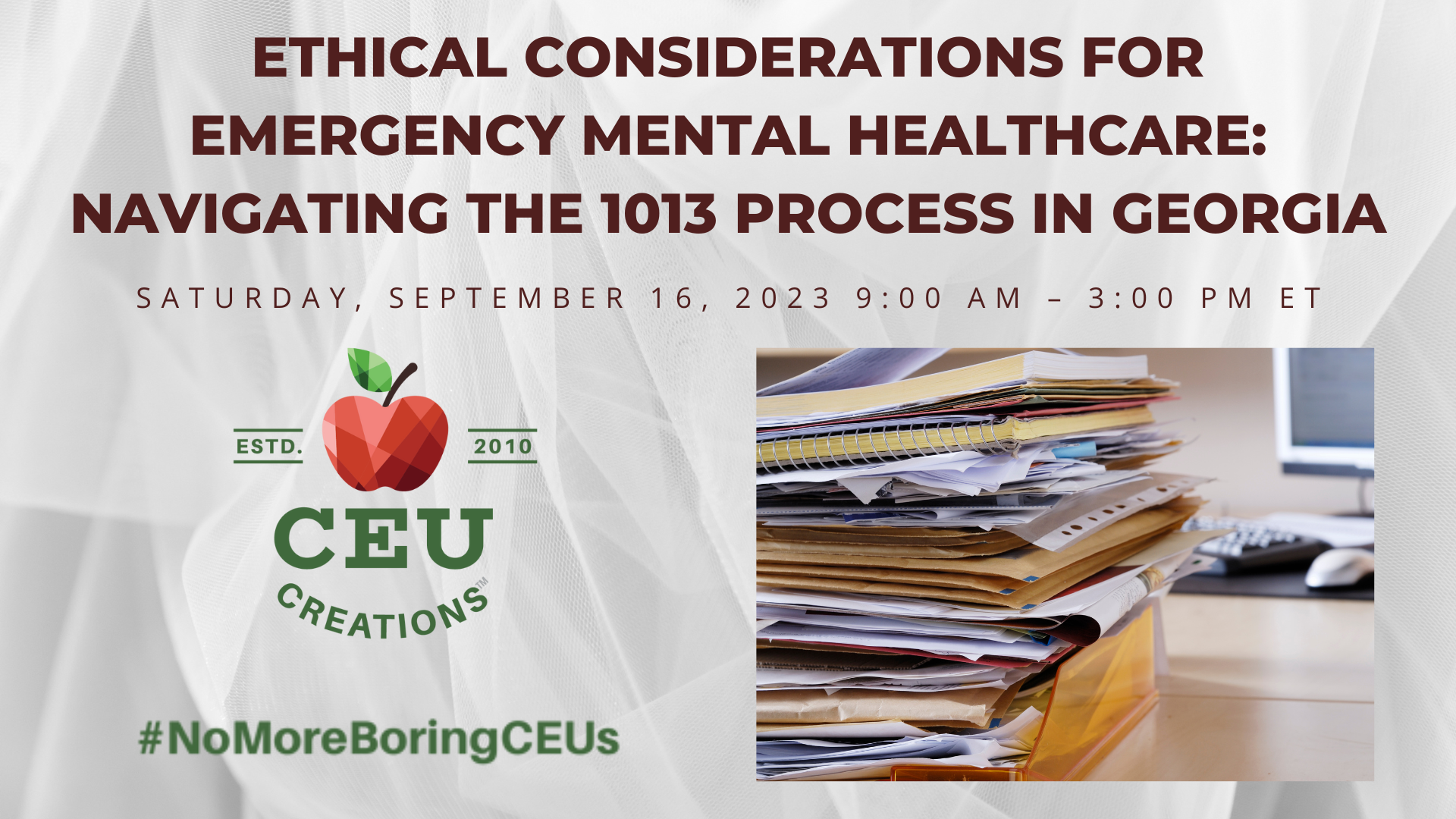Ethical Considerations for Emergency Mental Healthcare: Navigating the 1013 Process in Georgia
Date/Time
 Click here to view official flyer |
Date: Saturday, 9/16/23 Time: 8:45 a.m. - 3:00 p.m. ET Location: LIVE STREAM Cost: Early Bird Registration: $74.99 After September 2nd registration is $84.99 Credits: 5 Ethics credits! |
Presenters
Presented by:
Ralph Menard, M.S., LPC, CPCS, PhD(c)
Ralph Menard has seven years of experience working in crisis assessment and stabilization. He currently serves as the Director of Social Services for Coastal Harbor Health Systems in Savannah, GA and is an adjunct professor at South University. Ralph is a graduate of Auburn University with a B.A. in Psychology, an M.S. in Clinical Mental Health Counseling, and is in the dissertation phase of a doctorate in Counselor Education and Supervision at Mercer University. Mr. Menard has conducted several seminars on topics related to trauma, mental illness and crisis intervention at conferences and seminars in Georgia, Florida, Alabama, Louisiana, and Pennsylvania. Mr. Menard has published in the peer reviewed Journal of Counseling Research and Practice.
Ethical Considerations for Emergency Mental Healthcare: Navigating the 1013 Process in Georgia
8:45 a.m. – 9:00 a.m. ET: Log In / Virtual Networking
9:00 a.m. – 3:00 p.m. ET: Presentation-See event flyer for detailed agenda
COST:
Early Bird Registration: $74.99
After September 2nd registration is $84.99
Plus U Member Discount – Free
Continuing Education Credits
Social Workers
ASWB ACE – 5 Ethics CE Credits
New York State Education Department’s State Board for Social Work – 5 Contact Hours
Case Managers
CCMC – 5 Ethics Hours
Nurses
California Board of Registered Nursing – 5 Contact Hours
Counselors 5 Ethics Hours or 5 Contact Hours*
NBCC ACEP – 5 Contact Hours
NY State Education Department’s State Board for Mental Health Practitioners – 5 Contact Hours
*Some states do not recognize/award Ethics Hours for Counselors, in those cases Contact Hours will be awarded.
Attendance or applied credit certificate available for other credentials.
Please make sure to check with your own state board to ensure the transferability of CE credits.
Overview
Many people are confused about what to do in the face of a mental health emergency. In an ideal situation, clients with mental illness who are experiencing a crisis situation will consent to evaluation and participate in the treatment process. Unfortunately, there are many circumstances that may influence clients to reject evaluation and treatment, including fear, prior negative experiences, the state of the mental health system, and mental health symptoms themselves (paranoia, delusions, hallucinations, etc.). The 1013 Form in Georgia provides an avenue by which these clients can be involuntarily detained until receiving a thorough mental health evaluation in the event an authorized clinician assesses a substantial risk of imminent harm to self or others, or an inability of the client to care for his/her own physical health and safety. While arguably necessary for the safety and wellbeing of the client and others, the 1013 process is not without ethical dilemmas. Learning to identify a crisis and to be able to navigate the mental health system is critical to the care of the client and ensures the safety of the people around the client. In this informative ethical conversation, Ralph Menard, LPC, CPCS, PhD(c), will present an overview of the 1013 process in Georgia, including tips on assessing mental health emergencies and a discussion on the common diagnosis for people presenting in the ER in crisis.
By Attending Our Workshop, You Will Be Able To:
- Identify a mental health emergency
- Demonstrate a suicide/homicide risk assessment, a mental status exam, and a substance abuse evaluation
- Differentiate commonly used legal forms (1013/2013, 1009/1012, 1014, 1021, etc.)
- Relate clear expectations for clients/families who will be placed on a 1013/2013
- Apply professional ethical standards to dilemmas that can occur around the 1013 process
SPONSORS Featured 2023 Sponsors:



Additional information for each sponsor can be found in the 2023 CEU Creations Supporter Directory that will be provided to each registrant.
 |
 |
 |
